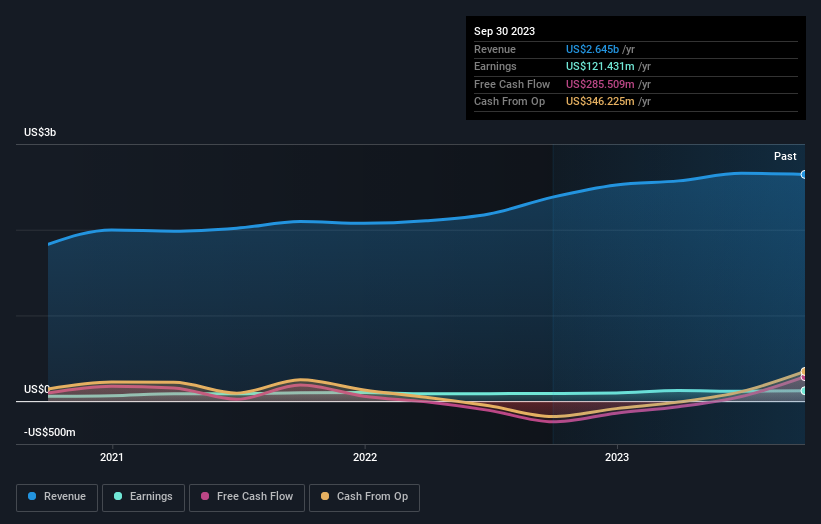Universal Corporation's (NYSE:UVV) large institutional owners must be happy as stock continues to impress, up 5.2% over the past week
Key Insights
Institutions' substantial holdings in Universal implies that they have significant influence over the company's share price
A total of 6 investors have a majority stake in the company with 50% ownership
If you want to know who really controls Universal Corporation (NYSE:UVV), then you'll have to look at the makeup of its share registry. And the group that holds the biggest piece of the pie are institutions with 78% ownership. Put another way, the group faces the maximum upside potential (or downside risk).
Last week’s 5.2% gain means that institutional investors were on the positive end of the spectrum even as the company has shown strong longer-term trends. One-year return to shareholders is currently 28% and last week’s gain was the icing on the cake.
Let's take a closer look to see what the different types of shareholders can tell us about Universal.
Check out our latest analysis for Universal
What Does The Institutional Ownership Tell Us About Universal?
Many institutions measure their performance against an index that approximates the local market. So they usually pay more attention to companies that are included in major indices.
As you can see, institutional investors have a fair amount of stake in Universal. This suggests some credibility amongst professional investors. But we can't rely on that fact alone since institutions make bad investments sometimes, just like everyone does. If multiple institutions change their view on a stock at the same time, you could see the share price drop fast. It's therefore worth looking at Universal's earnings history below. Of course, the future is what really matters.
Since institutional investors own more than half the issued stock, the board will likely have to pay attention to their preferences. Hedge funds don't have many shares in Universal. BlackRock, Inc. is currently the largest shareholder, with 15% of shares outstanding. Meanwhile, the second and third largest shareholders, hold 12% and 7.7%, of the shares outstanding, respectively. Furthermore, CEO George Freeman is the owner of 0.8% of the company's shares.
We also observed that the top 6 shareholders account for more than half of the share register, with a few smaller shareholders to balance the interests of the larger ones to a certain extent.
While studying institutional ownership for a company can add value to your research, it is also a good practice to research analyst recommendations to get a deeper understand of a stock's expected performance. Our information suggests that there isn't any analyst coverage of the stock, so it is probably little known.
Insider Ownership Of Universal
The definition of company insiders can be subjective and does vary between jurisdictions. Our data reflects individual insiders, capturing board members at the very least. The company management answer to the board and the latter should represent the interests of shareholders. Notably, sometimes top-level managers are on the board themselves.
I generally consider insider ownership to be a good thing. However, on some occasions it makes it more difficult for other shareholders to hold the board accountable for decisions.
We can see that insiders own shares in Universal Corporation. It is a pretty big company, so it is generally a positive to see some potentially meaningful alignment. In this case, they own around US$27m worth of shares (at current prices). Most would say this shows alignment of interests between shareholders and the board. Still, it might be worth checking if those insiders have been selling.
General Public Ownership
With a 20% ownership, the general public, mostly comprising of individual investors, have some degree of sway over Universal. While this size of ownership may not be enough to sway a policy decision in their favour, they can still make a collective impact on company policies.
Next Steps:
It's always worth thinking about the different groups who own shares in a company. But to understand Universal better, we need to consider many other factors. Be aware that Universal is showing 2 warning signs in our investment analysis , you should know about...
Of course this may not be the best stock to buy. Therefore, you may wish to see our free collection of interesting prospects boasting favorable financials.
NB: Figures in this article are calculated using data from the last twelve months, which refer to the 12-month period ending on the last date of the month the financial statement is dated. This may not be consistent with full year annual report figures.
Have feedback on this article? Concerned about the content? Get in touch with us directly. Alternatively, email editorial-team (at) simplywallst.com.
This article by Simply Wall St is general in nature. We provide commentary based on historical data and analyst forecasts only using an unbiased methodology and our articles are not intended to be financial advice. It does not constitute a recommendation to buy or sell any stock, and does not take account of your objectives, or your financial situation. We aim to bring you long-term focused analysis driven by fundamental data. Note that our analysis may not factor in the latest price-sensitive company announcements or qualitative material. Simply Wall St has no position in any stocks mentioned.


